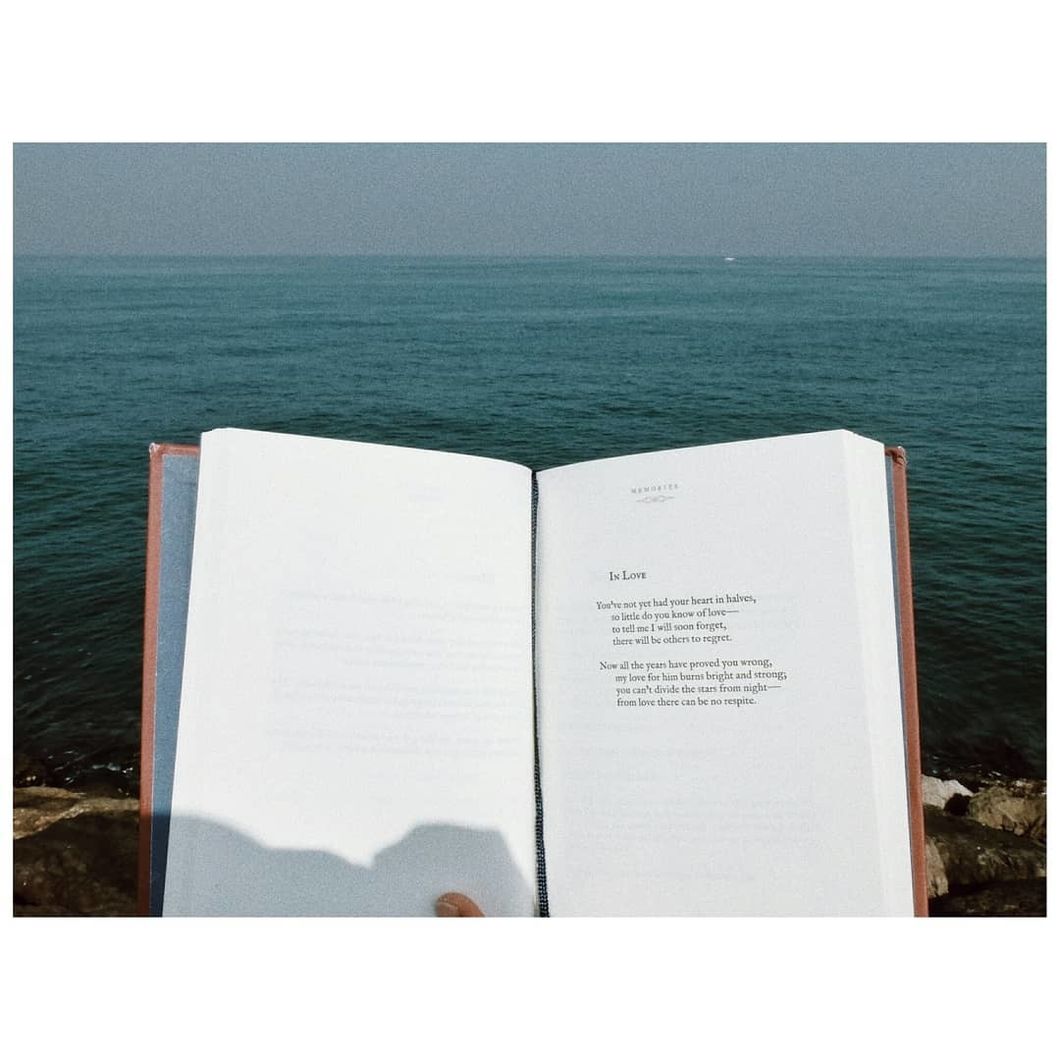Although there are many genres used to categorize varying styles of literature, the most general yet rewarding form of writing is poetry.
While many people believe poetry is a tedious form of literature that requires strict rules of rhyme and rhythm, writing poems is simply a way to express thoughts and emotions without any concern for character or plot structure. The author is also able to use a variety of figurative language such as metaphors and symbolism to engage the audience in a direct manner that stories can not.
Most people interested in poetry feel discouraged from trying to create poems on their own because they believe one must possess a talent for writing to be successful. However, creating poems is as simple as finding the right words to communicate how you feel, regardless of whether you choose to follow strict form in the process. When you start feeling comfortable with poetry as an art form, you open yourself up to the ability to verbalize complicated feelings and gain the satisfaction of allowing others to read and connect with your work as well.
To show beginners that writing poems isn't as difficult as it may seem and also inspire fellow poets struggling with writer's block, here are 10 easy ways to be a poet for when you're eager to put something down on paper but aren't quite sure where to start.
1. Paint Sample Poetry
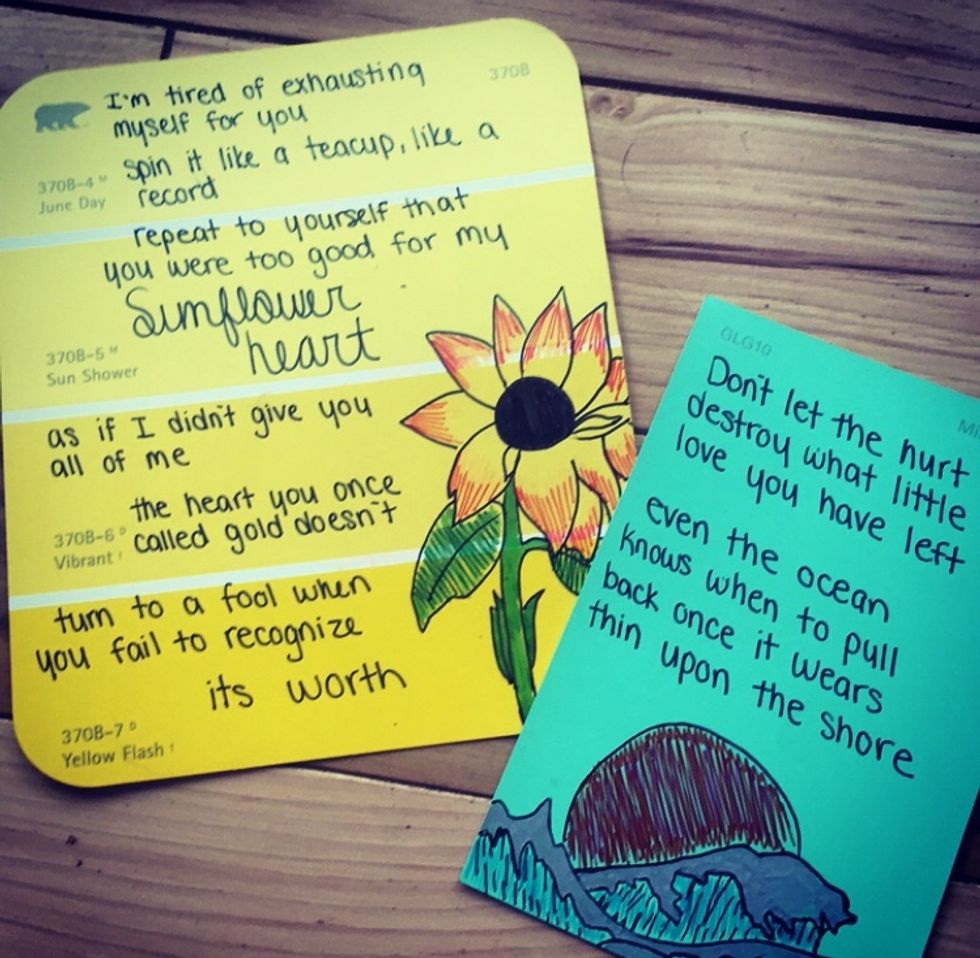
Whether at your nearest hardware store or supermarket, paint samples are free and very easy to come by. Let the colors inspire you to draw from memories associated with the sample names, or use the unique shades to engage certain emotions that can be reflected in your work. Once you've become motivated by the energy of a certain hue, write the poem on the paint sample to allow your reader to visualize the tone set throughout the piece. The sample paper is also sturdy and compact, so you can easily store your poems together in a plastic bag when you're finished and pour them out to read them later.
2. Notebook Poems
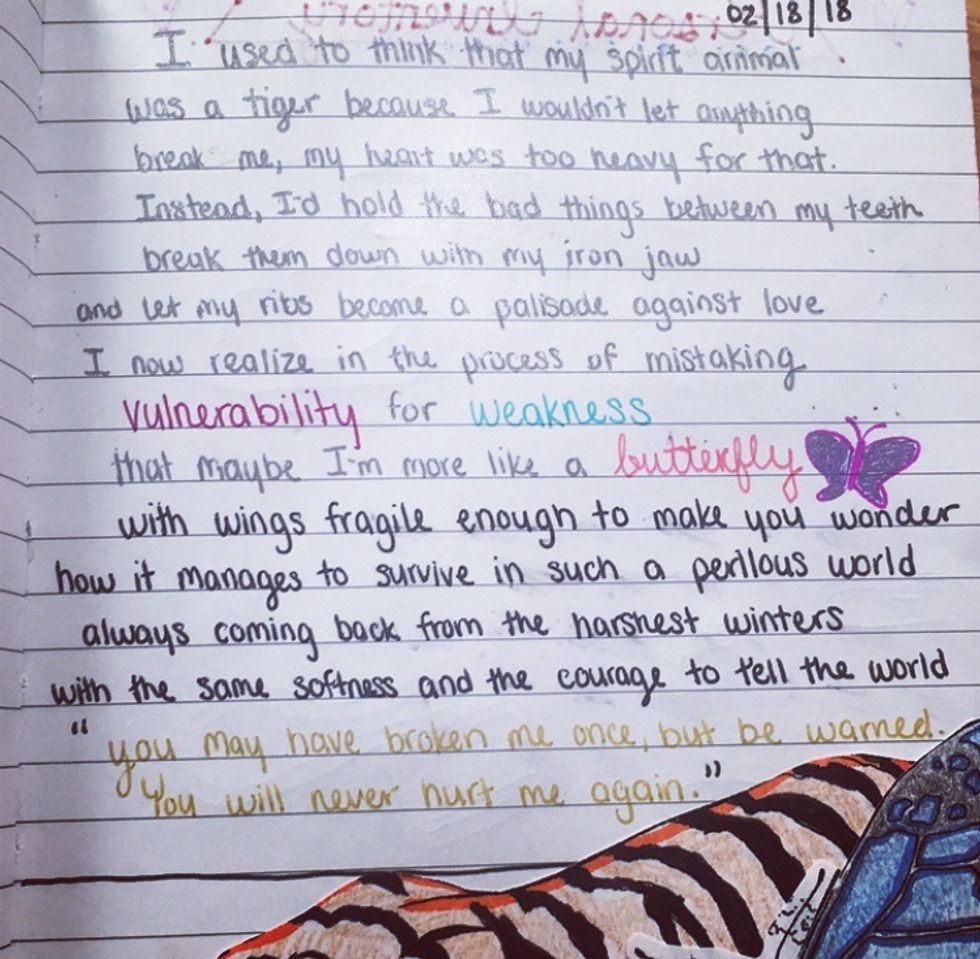
If you have an empty notebook just sitting around in your closet, starting a journal is the perfect opportunity to enhance your writing abilities. Whether it's a word that interests you, a line you'd like to use in a future poem, or an entire poem itself, a journal gives you a chance to both break down and build up your ideas to eventually move them to an online document or book of poems once you feel confident with your work. A journal is also good for writing down song lyrics and personal rants when you feel more like venting instead of creating.
The importance of giving yourself a space where it's okay to write messy will allow you to feel more comfortable with your writing abilities over time and give you a place to organize all of your potential ideas. However, this idea only works if you're willing to make mistakes and accept that not everything you write down is going to be perfect.
3. Notes App
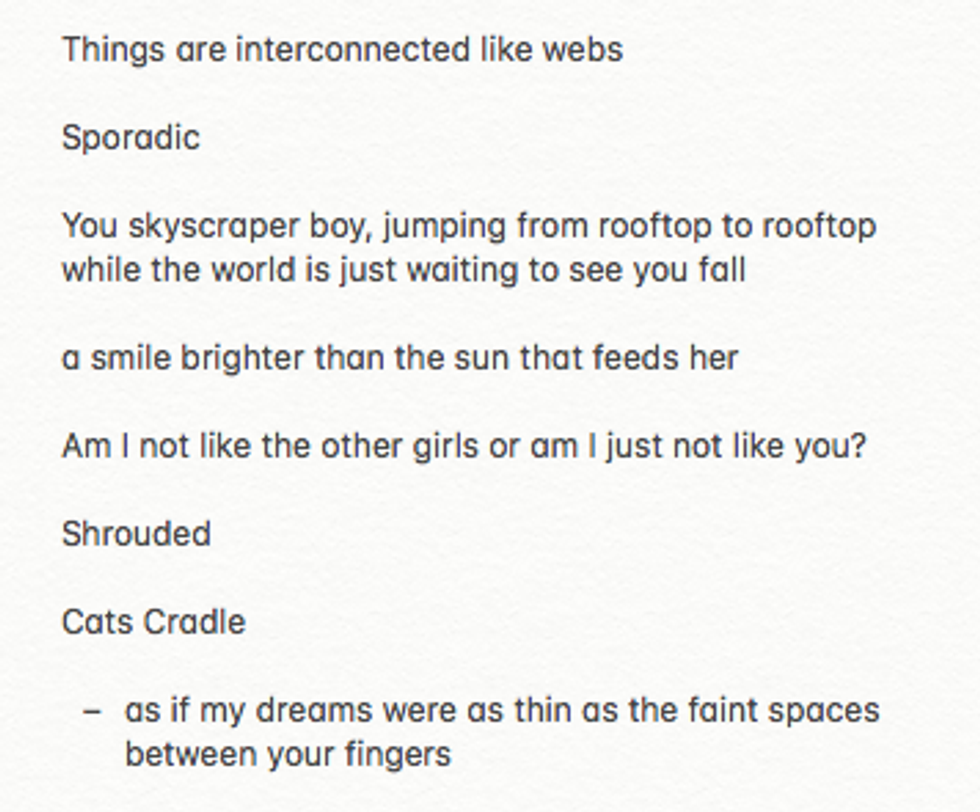
A necessity for any poet is the notes app, a utility installed on your smart phone allowing you to jot down any sudden thoughts you might have when there isn't a pen and paper nearby. Notes can organize your ideas into separate documents, create bulleted and numerical lists for planning your piece's structure, and make your writing more accessible by bringing your work wherever you go. You can even bold and underline specific words or phrases to focus on what you'd like to edit later. While taking notes on your phone doesn't allow the versatility of physically writing out your ideas, it can be quicker and easier than handwriting for those without the patience for writing in notebooks.
4. Recycle Old Poems
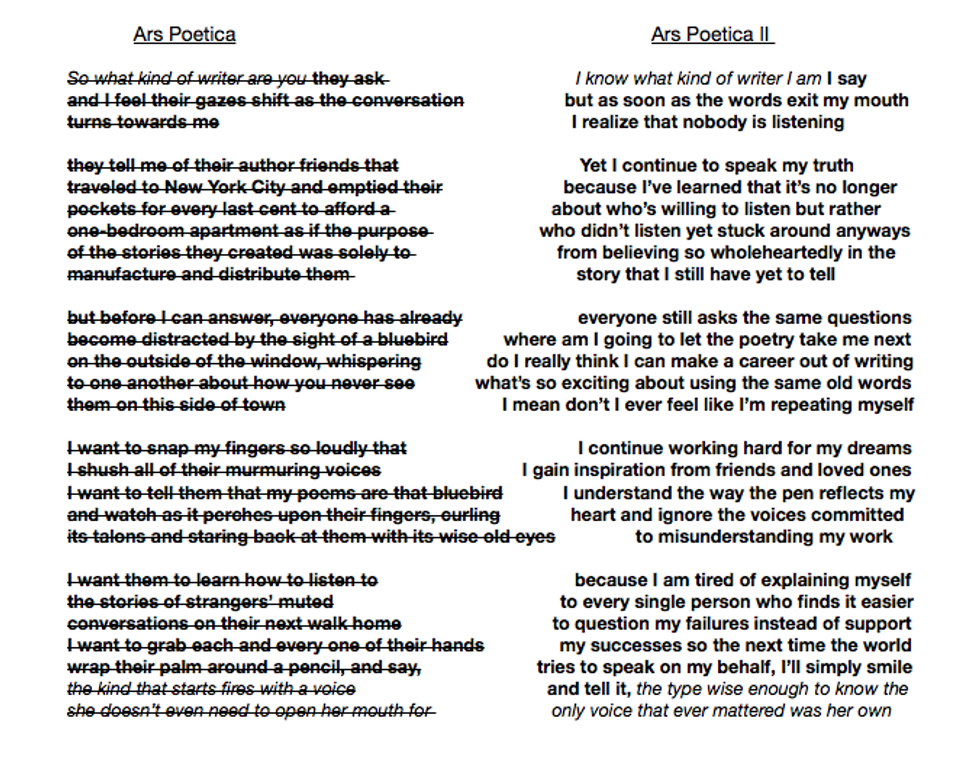
When you want to write but you're really running out of ideas, the fastest way to become motivated can occasionally be found through your own work. Whether you want to copy an entire line or an idea for a poem, as long as it's your work, there's no harm in reusing elements you love to try out different writing styles. If you're an experienced poet who isn't into using secondhand ideas, I'm sure you have an unfinished piece somewhere you've been meaning to complete.
And if you're brand new and just starting to write poetry, don't be afraid to write about a feeling or situation more than once. Writing about a topic from one perspective doesn't mean you aren't capable of writing about it from another! Just be sure not to use this method too many times; while using old poems to inspire yourself can help get you in the right mindset, starting new work from scratch is just as important.
5. Graffiti Poetry
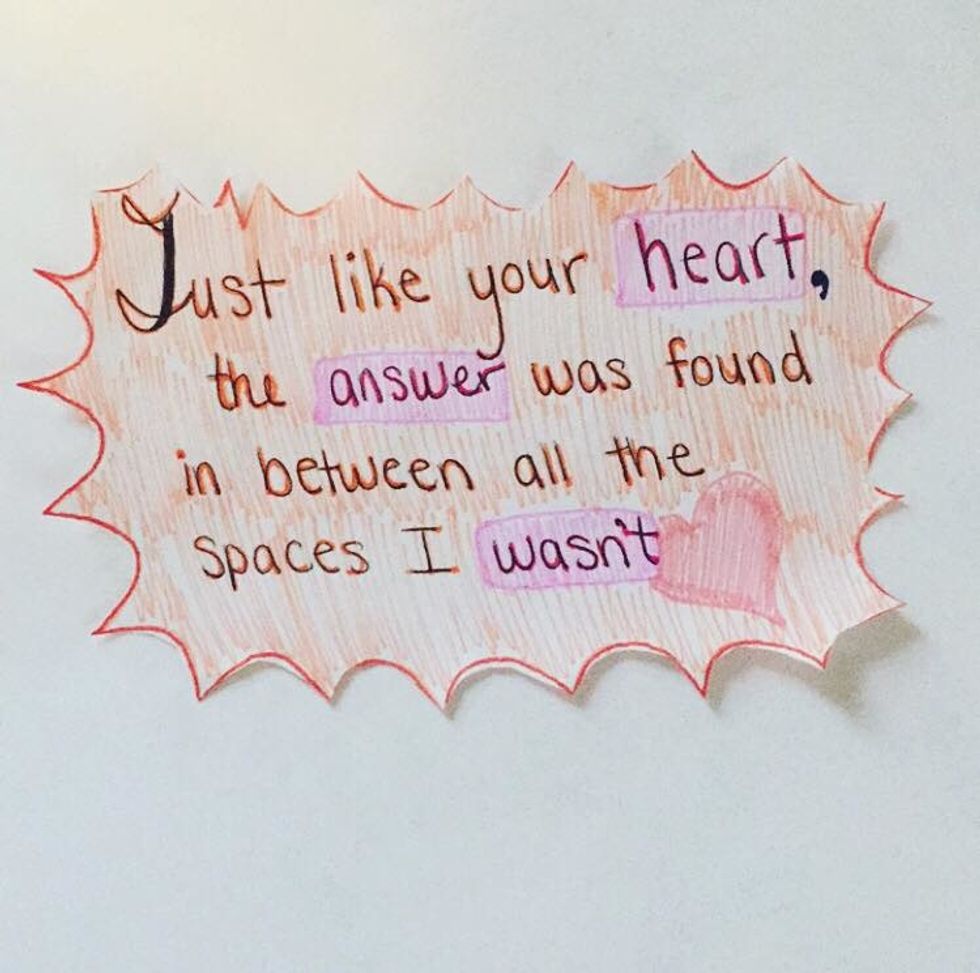
There's nothing more fascinating to a writer than words found in unconventional places, especially when they're anonymous and unfiltered. Vandalism is definitely not encouraged, but almost everyone would be lying if they said they hadn't left their own mark on a bathroom stall or park bench at some point in their lives. What many people may not know though is while writing on public property is still illegal, this technically qualifies as a poem! However, instead of choosing to write on whatever you can find, I recommend copying the style associated with graffiti as a way to combine both words and art in a visually expressive format. This technique is used frequently by Instagram poets, considering that its presentation allows for short one-line poems often followed by aesthetic graphics that appeal to poets and non-poets alike.
6. Blackout Poetry
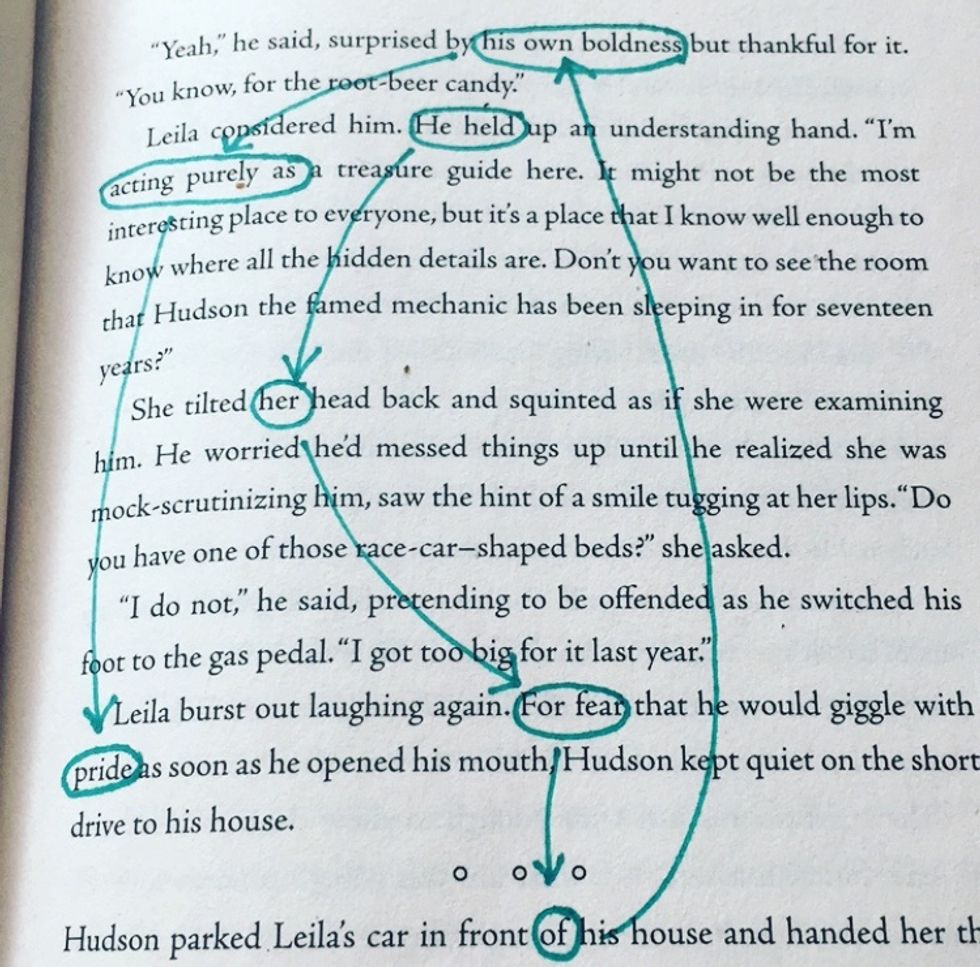
If you love the mystery of creating poems in an unpredictable fashion but are never quite sure where to start, a good way to begin is as easy as finding a permanent marker and an old book to destroy. Blackout poems are a way to recycle the work of others through using a page of any written text and crossing out the words irrelevant to the piece to create a brand new poem. The finished poem often has a similar tone to the original document the piece is constructed from, but this doesn't always have to be the case.
Sometimes if you don't feel like blacking out an entire page, circling the words or phrases and using arrows to connect them can also be effective as long as you limit your word count. It also may be more efficient to circle the words you want to use before blacking out the poem so you don't get confused while trying to connect everything together. But once you feel confident with the spontaneity and awkward flow this system of poetry provides, you'll always have a reliable way to create poems that call you back to your creative roots no matter how far away you may wander.
7. Magazine Word Collages
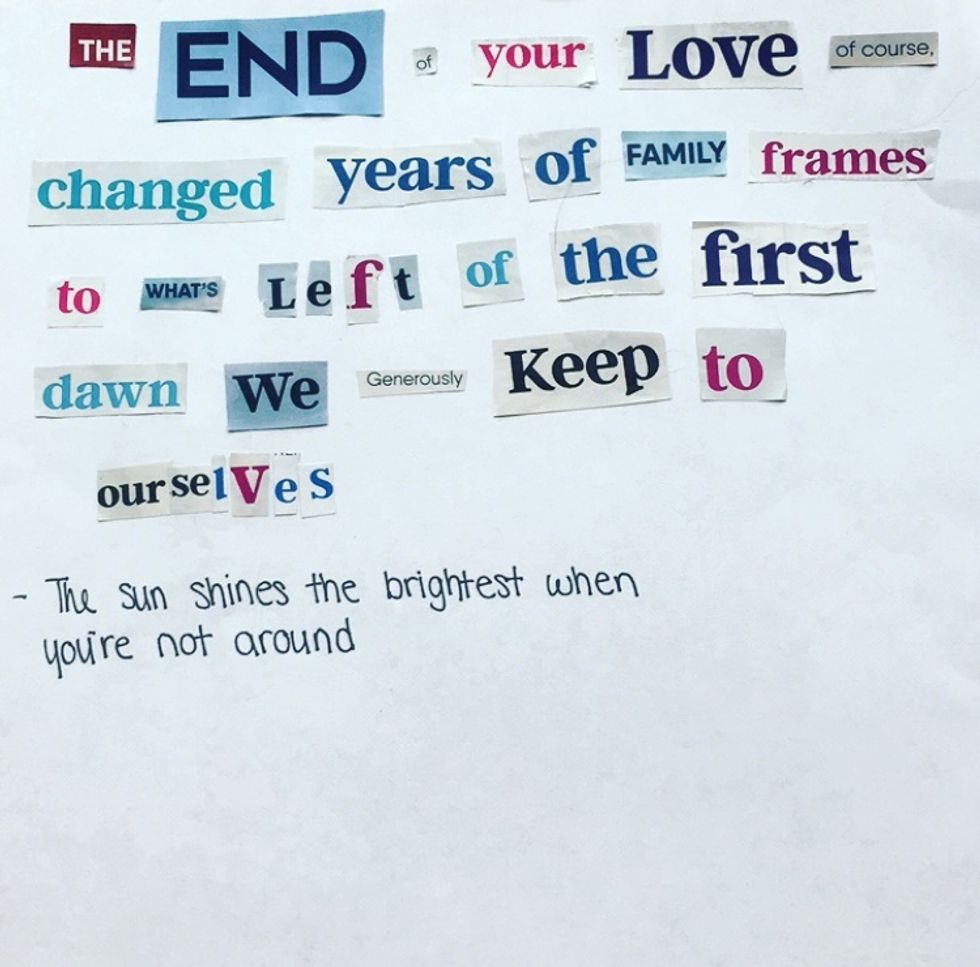
Although quite similar to blackout poetry, magazine collages allow for an unusual twist on producing compositions due to the fonts and vocabulary associated with journalist articles. This artistic craft expands the word choice able to be used in a poem because you can mix and match so many varying magazine genres or focus on just one, it's all up to your own work's intention. You can also alternate letter sizing to customize handmade looks that can't be obtained from typing on a computer. It especially helps to keep a container filled with cut out words from different magazines so you'll have a variety of materials to work with whenever you decide to start a collage.
This method is a cheaper alternative to the magnet poetry kits while being eco friendly as well since you can recycle the paper when you're done. In my opinion, this technique is more advanced than blackout poetry because of a broader language spectrum to choose from. The level of difficulty really just depends on who you are and whether you write better when given an open canvas or when following strict rules. Nonetheless, magazine collages are still a great opportunity to open yourself up and test what you're capable of when given unlimited potential for your writing.
8. Improv Audio Poetry
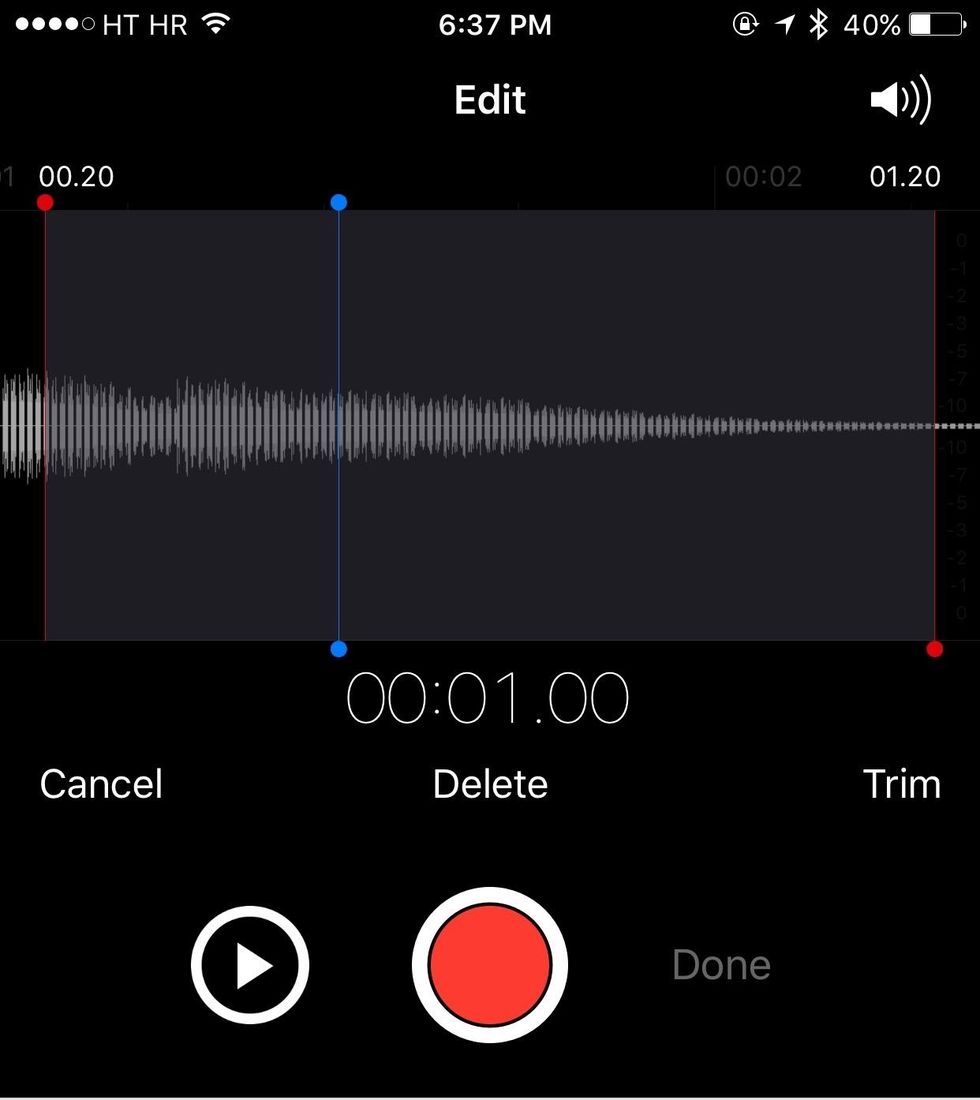
If you're really willing to become vulnerable during your drafting process, a more interactive way to begin structuring a poem is through brainstorming with an audio device. While this process may sound confusing, audio poems are as simple as recording yourself with your smart phone to form your own type of auditory journal. There are no rules to how you should record yourself, so you can embrace your adventurous side by trying to write a poem without feeling limited by the page or simply just talk openly about your life without worrying about who'll hear you.
There are even pre-installed apps that focus on creating voice memos, allowing you to title each audio file and record for as long as your phone storage will allow. It may sound like rambling at first, but recording your inner thoughts and listening to yourself can give you lines to work with in future poems and sometimes let you know what's been on your mind. Once you're able to understand what's been bothering you or what you've been excited about lately, you can choose what topic might be easiest for you to focus on and begin from there.
9. Acrostic Poetry
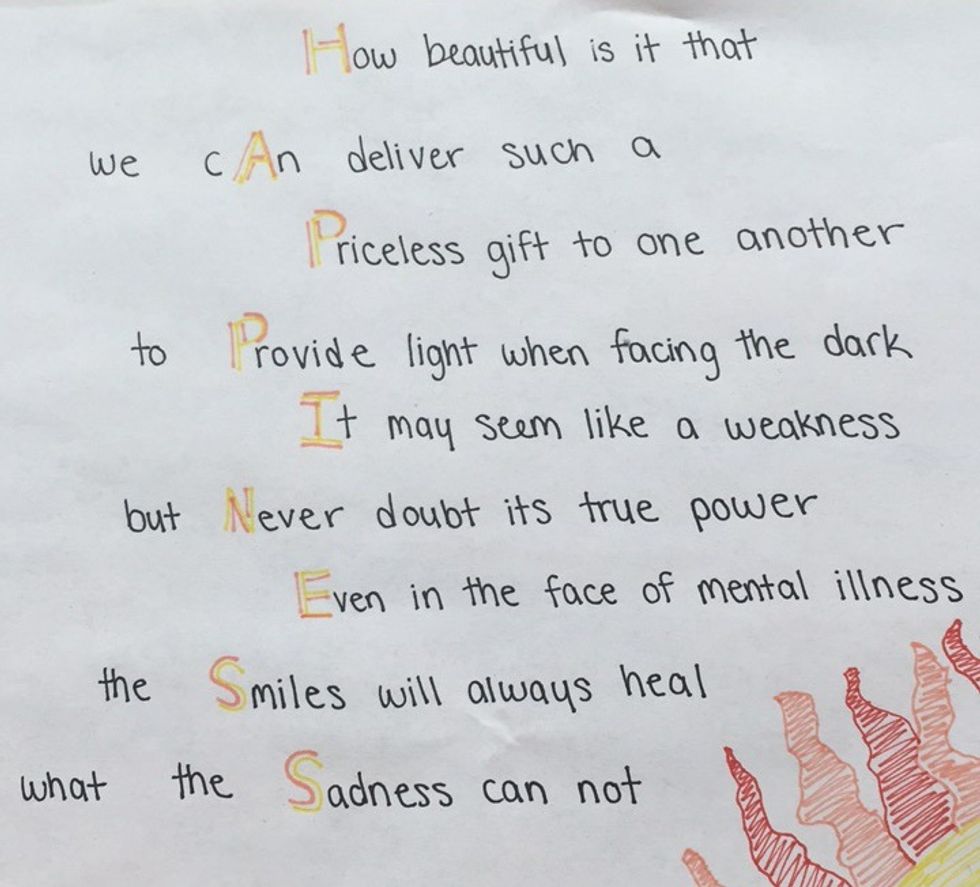
While this form isn't always the most effortless way to write, a unique system of presenting your work that can also be very rewarding is acrostic poetry. Acrostic poems involve taking a word and using its letters as a base when building a poem verse. They are a fun way to create unique poetry while limiting your work to approximately one stanza, especially because you don't have to start with the letters of your chosen word at the beginning of each line. As long as you clearly emphasize the word being used as a template, you can be flexible with how you choose to incorporate each letter which gives this literary trend so many possibilities.
These poems have the advantage of creating a beautiful yet controlled picture while spelling out the poem's theme so the reader can understand the main focus without having to search for it. Because the acrostic style can apply to so many different themes and are easy for children to comprehend, this style of poem is commonly used to teach elementary school students about poetry. As a result, creating deep and meaningful pieces of work in this manner can be difficult, but it sounds like the perfect challenge for a writer tired of the same ordinary format.
10. Conversation Poetry
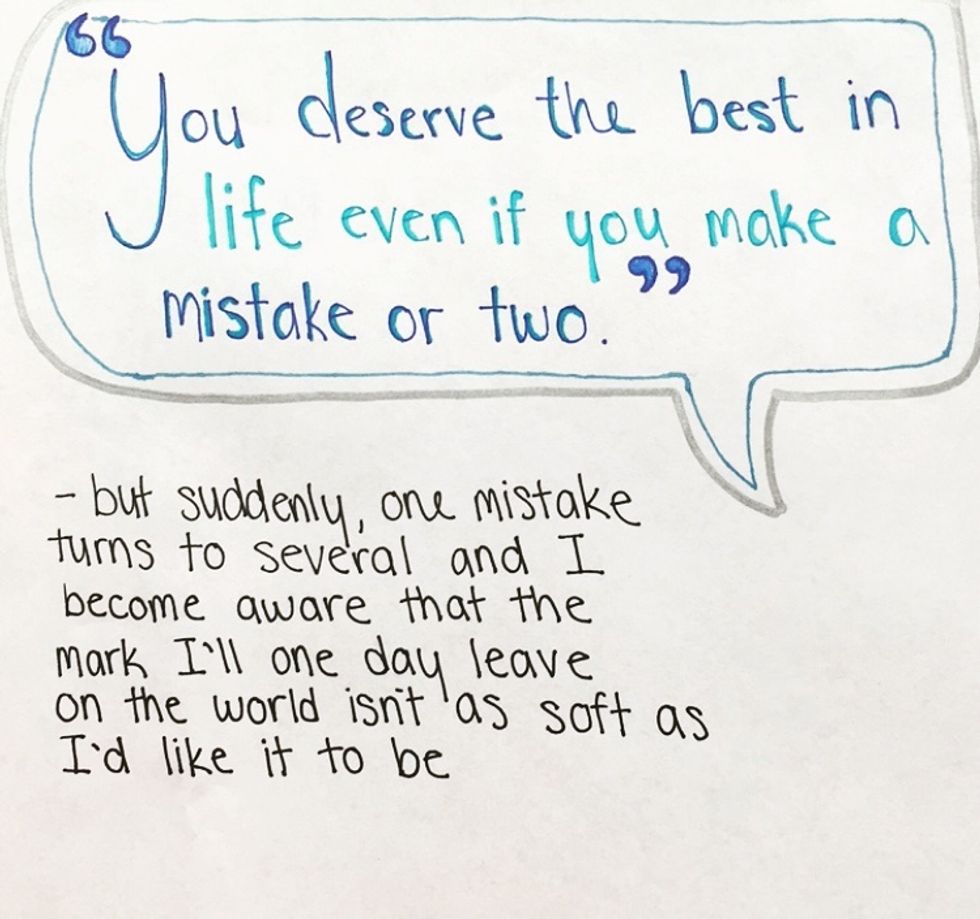
Because poetry starts with words, there are so many ways to influence your work whether through books, music, or your favorite memories. Even the most famous poets say to find inspiration from the world around you, so why not start with everyday conversations? You can steal lines from late night talks with friends or even write down a peculiar sentence you heard a stranger say while walking down the street.
After finding a phrase that piques your interest, you can either use the phrase as a direct quotation or play around with the wording to construct a line you like even better. When you use everyday sentences to spark your writing, you have so many options on which direction you could take your work. Also, because verbal dialogue is such a necessary part of life, you'll never run out of ideas you could use later on.
(all of the poems included are made by me, so if you enjoyed reading them, please follow my instagram account @lunarlullababe!)

